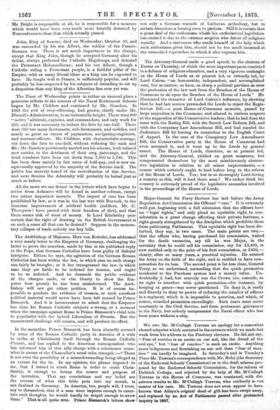The Attorney-General made a good speech to the electors of
Exeter on Thursday, of which the most important parts consisted in a defence of religious education, and a very vigorous onslaught on the House of Lords as at present led, or virtually led, by Lord Cairns, "an honourable, independent, and accomplished man, but as narrow, as keen, as sharp a political partisan as ever the profession of the law sent from the Benches of the House of Commons to sit upon the Benches of the House of Lords." He illustrated the character of Lord Cairns's influence, by showing that he had last session persuaded the Lords to reject the Regis- tration Bill,—a pure House-of-Commons measure, passed by large majorities in the Commons, and altered in various respects at the suggestion of the Conservative leaders; that he had done the same with the Rating Bill, with the Scotch Law Reform Bill, and with the Conspiracy Law Amendment Bill, and had mauled the Judicature Bill by forcing its restriction to the English Court of Appeal. In the case of the Conspiracy Law Amendment Bill, the Conservative party in the House of Commona had even accepted it, and it went up to the Lords by general assent. The House of Lords, therefore, as at present led, said the Attorney-General, yielded on great measures, but compensated themselves by the most mischievously obstruc- tive legislation in relation to all minor improvements, — a course -which certainly ought to lead before long to the reform of -the House of Lords. Yes; but ins° thoroughly Lord-loving a country as this, will it lead there soon? We rather think the country is extremely proud of the legislative anomalies involved in the proceedings of the House of Lords.


































 Previous page
Previous page